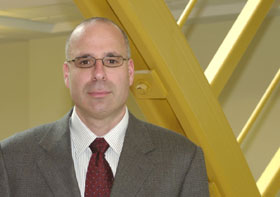|
This is an archived article. For the latest news, go to the Advance Homepage
For more archives, go to the Advance Archive/Search Page. |
||
|
New Director Hopes To Boost
Ross Lewin has been appointed executive director of Study Abroad Programs at UConn. He joined the University Jan. 15 from the University of North Carolina at Chapel Hill, where he was director of the Burch Field Research Seminar and Honors Study Abroad.
"UConn is fortunate to have attracted an educational leader of Ross Lewin's caliber to head the Study Abroad Office," says Lynne Goodstein, associate vice provost and director of Honors Programs. "His vision, dynamism, and passion for quality will help position the University of Connecticut to become a leader in the development of innovative and exciting study abroad opportunities." University officials also hope that a strengthened Study Abroad program will help in the recruitment of top-notch students. Lewin says part of the program's mission is "to deliver high-quality, meaningful and safe international opportunities to every UConn undergraduate. "One of the goals of the program is to prepare students to become leaders in the 21st century," he says. "In order for students to be competitive in the global marketplace, I believe they should have an international experience. They'll need to acquire cultural and linguistic literacy to move more easily through the world. Unless someone can understand other cultures, he or she isn't going to be maximally competitive in the marketplace." One of Lewin's objectives is to make the Study Abroad Program reflect other achievements of the University. In order for this institution to continue to realize its goal of being considered among the nation's top public universities, he says, it has to provide a first-class Study Abroad program. "UConn is an institution that is clearly on the move," he says. "I'm excited to be here for that reason." Increasing the number of students who participate in Study Abroad programs will be a major goal, Lewin says. Currently, about five percent of UConn students study abroad. Within the next four or five years, he hopes to have "well over 20 percent" of undergraduates spending a semester abroad during their University career. In order to do this, he says, "we have to figure out what the impediments have been to students studying abroad. What's keeping them from going abroad? Is it access? Is it credit issues? Is it housing when they return to Storrs?" Lewin also wants to encourage more faculty-led Study Abroad programs, some of which would be limited to honors students. These interdisciplinary programs, involving about 15 students, would be held in cooperation with the Honors Program and at least one academic department, he says. "The departments could list the Study Abroad Program the same way other courses are listed. It would be integrated into the curriculum. We could do that in many academic areas." Faculty who teach courses overseas can benefit as well, Lewin says: "The world is our oyster. We have a faculty with international interests. We can work together to create an extraordinary teaching experience, or an opportunity to conduct research and engage undergrads in research projects." He plans to work with faculty to create programs they would lead, that combine traditional course work with a hands-on experience - either in the form of research projects or internships. These could be anything from oral history projects and archaeological digs to artistic performances, he says: "We're going to make sure the academics enrich the experience and the experience enriches the academics." Lewin began teaching courses in German and the humanities at Stanford in 1990, and received the university's Centennial Excellence in Teaching Award. He also has held assistant professorships at Bates College, Deep Springs College, Guilford College, and the University of North Carolina, and served as dean of students at Deep Springs College in California. He earned a master's and doctorate in German studies at Stanford University, and his bachelor's degree in politics and literature from the University of California at Santa Cruz. |

